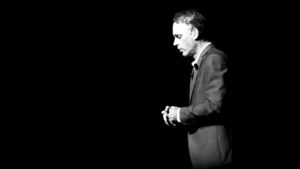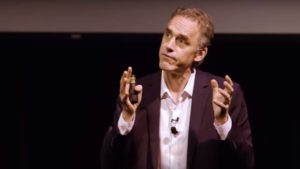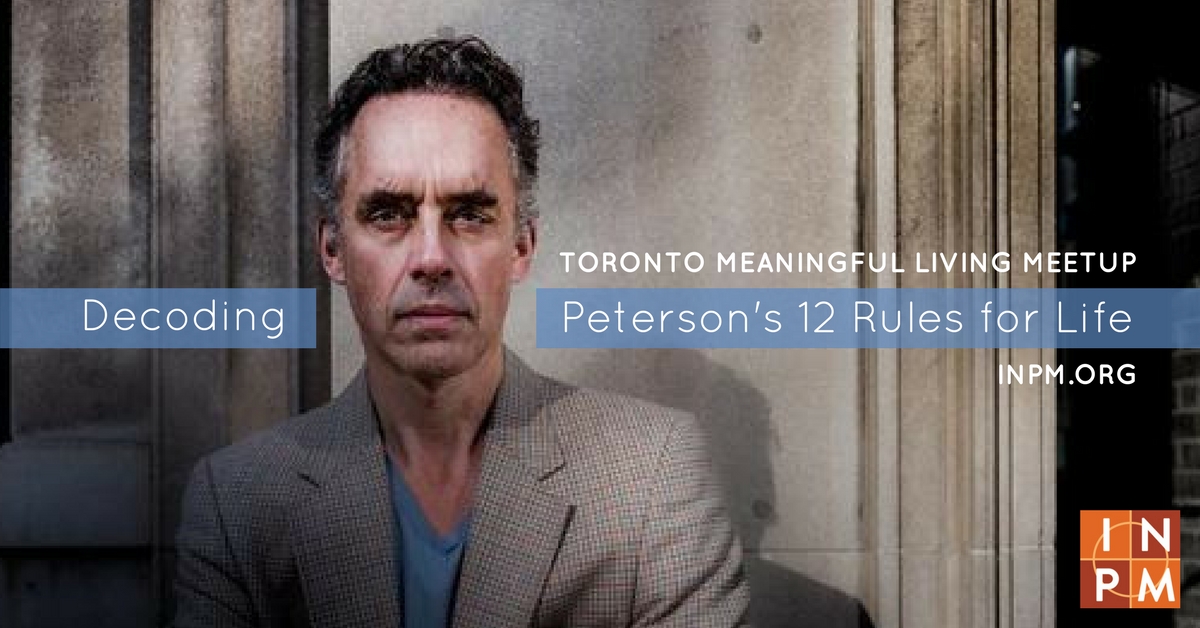MEETUP 2018
Decoding Peterson’s
12 Rules for Life
This is the first of four Meetups on “Decoding Jordan Peterson’s 12 Rules of Life,” hosted by Dr. Paul Wong for the INPM’s Meaningful Living Project. For an overview of this Meetup series, see below.
 This is the first problem used by atheists to challenge believers in all religions: If God is all powerful and all loving, how can he allow evil and suffering in the world? If God exists, then he is either powerless or unloving.
This is the first problem used by atheists to challenge believers in all religions: If God is all powerful and all loving, how can he allow evil and suffering in the world? If God exists, then he is either powerless or unloving.
Peterson tackles this fundamental question honestly and optimistically: “Why? Why is there so much suffering and cruelty?” (Peterson, 2018, p. 131) He presents a Biblical worldview that not only accepts the reality of evil and suffering, but also provides the cause and the solution of the problem. He readily acknowledges that “life is in truth very hard. Everyone is destined for pain and slated for destruction” (p. 149).
The Reality of Evil and Suffering
Citing Christ, Buddha, Tolstoy, Dostoevsky, and Frankl, Peterson argues that all great thinkers have framed their solutions by beginning with this acknowledgement. He puts forward that we do not need scientific proof that life is suffering, because every living human being can attest to that. He also posits that the human proclivity towards evil is also a self-evident truth: We pick up bad habits naturally, but it requires effort and a moral compass to become a good person.
For years, I have also been arguing that to understand happiness and wellbeing without considering the dark side of human existence is just as irresponsible as physicians and medical scientists focusing only on physical health without addressing the reality of pathogens and pain (Wong & Bowers, 2018). Both Peterson and I agree that if you seek happiness by assuming that life is good and fun, you will only be deceiving yourself and ill-prepared for what will hit you; but if you begin with the assumption that life is hard and full of suffering and fortify your character, you will be prepared for all eventualities and find mature happiness (Wong & Bowers, 2018).
‘The good life’ is not one that is achieved through momentary pleasures or defensive illusions, but through meeting suffering head on and transforming it into opportunities for meaning, wisdom, and growth, with the ultimate objective being the development of the person into a fully functioning mature being. On this formula for happiness, age-old wisdom and modern science are in agreement.
The above passage is actually from Robert Emmons’ (2003) book, The Psychology of Ultimate Concerns. This is also the message of Wong’s (2012a) existential positive psychology (EPP) or second-wave positive psychology (PP 2.0). Jordan Peterson has popularized and expanded on this existential view of finding meaning in life in spite and because of the dark side of human existence.
In addition, Peterson has taken one step further beyond Emmons by claiming that ancient wisdom—in terms of myths, symbols, and religion—is more important than modern science in teaching us who we are (our human nature), where we came from (our cultural heritage), and how we should live (our moral compass for the present and the future) in order to advance wellbeing for oneself and humanity. In other words, transcendental truth based on time-tested ancient wisdom can stand alone in its own right without the validation of modern empirical science; the truthfulness of existential/spiritual truth can be experienced by every human being willing to embrace and practice it in their daily living and verified by the good fruit it produces and the resulting transformed life despite adversity.
In short, Peterson eschews the simplest answers of American positive psychology and challenges us with the idea that existential truth and meaning can only be found in negotiating the right balance between life and death, happiness and misery, strength and weakness, and reason and faith. Meaning and happiness are experienced in the striving for the right balance in the dialectical process.
Sources of Evil and Suffering
 In this lesson, Peterson identifies the sources of evil and suffering and gives reasons as to why the Biblical narrative makes sense and transforms our lives. According to this perspective, evil and suffering began with the following:
In this lesson, Peterson identifies the sources of evil and suffering and gives reasons as to why the Biblical narrative makes sense and transforms our lives. According to this perspective, evil and suffering began with the following:
- Adam and Eve exercised their free will and deliberately broke the most basic moral law that there are inherent limits to our status as creatures. For succeeding generations, we have repeated the same offence by wanting to play God and thus have suffered the same consequences.
- The fruit of Good and Evil means that, prior to the Fall, Adam and Eve only knew the good life of walking with God in the garden of Eden. However, after the Fall, they experienced for the first time what it means to know experientially or be self-conscious of their shame, guilt, fear, and anger due to being alienated from God.
- The need to toil, the travail of child-birth, illness, old age, and death are natural consequences of the Fall. Floods, earthquakes, and other natural disasters fall under the same category.
- The above natural sufferings are easier to endure than human evils because they are just part of being alive in a fallen world, wherein we have to contend with chaos and disorders that result from rejecting the basic moral law. On the contrary, human evils belong to a whole new dimension, capable of causing far more suffering. These evils include: vengeance for suffering from injury and injustice; imposing a totalitarian ideology on others, by force if necessary; unbridled greed and selfish ambitions; and indulgence in the desires of the flesh aided by power and wealth.
“For where jealousy and selfish ambition exist, there will be disorder and every vile practice.” — James 3:16
Thus, the self-centered pursuit of happiness and success without any ethical concerns is by itself a course of evil and suffering. “The voluntary evil we do one another can be profoundly and permanently damaging, even to the strong” (Peterson, 2018, p. 177).
In view of the above analysis, it seems silly and arrogant to blame God for our problems. In fact, it is this blaming and directing our anger against God that compounds the problem of evil and suffering.
“The biblical worldview is the only one that accepts the reality of evil and suffering while giving both the cause and the purpose, while offering God-given strength and sustenance in the midst of it.” — Ravi Zacharias (2000)
Rule 6: Set your house in perfect order before you criticize the world
 It is how you react to evil and suffering that determines your destiny. You can either respond with anger and vengeance, resulting in more evil and suffering, or with self-examination as to whether you have contributed to your problem and then assume the responsibility for self-improvement. The former response leads to mass killings like the Columbine High School massacre; the latter leads to positive personal transformation and uplifting the human spirit.
It is how you react to evil and suffering that determines your destiny. You can either respond with anger and vengeance, resulting in more evil and suffering, or with self-examination as to whether you have contributed to your problem and then assume the responsibility for self-improvement. The former response leads to mass killings like the Columbine High School massacre; the latter leads to positive personal transformation and uplifting the human spirit.
“The human race isn’t worth fighting for, only worth killing… Nothing means anything anymore,” so wrote Eric Harris, one of the Columbine High School killers. This is the inevitable conclusion of nihilism. Even Leo Tolstoy went through a time when he questioned the value of human existence. “According to rational knowledge, it followed that life is so evil, and people know it… I have known for a long time that life is meaningless and evil.” (Tolstoy, 1887-1983, p. 58).
However, Peterson also cites the case of Solzhenitsyn, author of The Gulag Archipelago. Solzhenitsyn was imprisoned in a Soviet labour camp by his own people, the Communist Party, after which he was struck with cancer. He had every reason to be bitter and curse God, but he chose to respond in a positive manner. He carefully reviewed his life and wondered whether he had contributed to his own predicament by blindly supporting the Communist party. He then wondered how he could repair the damage caused by his past mistakes of violating his own conscience. The result: “One man’s decision to change his life instead of cursing fate, shook the whole pathological system of communist tyranny to its core” (Peterson, 2018, p. 155).
We all have reasons to be angry towards injustice, abuse, or a harsh fate. Anger can either become a positive force for self-improvement and success or a destructive force of revenge and violence. Our choice determines whether we live a productive and happy life, or a life of anger and hatred. As a whole, negative emotions are essential for living the good life because we need them to learn rules and boundaries. These unpleasant feelings can shape us to become responsible and decent human beings. It follows that the productive way to change society is to bring order and progress to our own life first; when people reverse the order, it will only result in more frustration and chaos.
Peterson, in citing the Bible that the wages of sin is death (Rom. 6:23), argues that Jewish history has shown that though Jews blamed God for their suffering in a fallen world despite their own breaking of God’s law, when they repented and reaffirmed God’s goodness and assumed responsibility for their failures and problems, they experienced restoration
Even the motive to exact revenge on the world for one’s suffering and unfair treatment via worldly success can destroy one’s own life. At the end, success in exacting revenge is not sweet at all; it will only fill one’s life with emptiness and regret for having wasted one’s life in doing so many bad things against one’s own conscience.
No one has the complete knowledge or the right to be both judge and executioner. To condemn and punish the world or others is to set up oneself as God, which is the original root of human evil and suffering. Peterson suggests that we can get out of this eternal loop of more suffering by considering an alternative spiritual path as provided by the biblical narrative of Paradise and the Fall.
Peterson’s solution to the problem of evil and suffering is very simple and practical: Stop criticizing and condemning others, and start bringing order to your own life. You can start small, such as cleaning up your messy room or unorganized desk. You need to strive to be a better person, to be your best self. If all people choose this positive alternative to their pains, “the world might stop being an evil place” (Peterson, 2018, p. 159).
 Rule 6 enjoins us to bring our lives in order first before we try to change the world. This is very similar to Confucius’ teaching on world peace. We need to bring order to our own lives first before we can have world peace. Throughout his book, Peterson also emphasizes that self-improvement will work, only if we aim heavenward towards some transcendental moral law based on time-tested ancient wisdom, such as the Bible or Daoism.
Rule 6 enjoins us to bring our lives in order first before we try to change the world. This is very similar to Confucius’ teaching on world peace. We need to bring order to our own lives first before we can have world peace. Throughout his book, Peterson also emphasizes that self-improvement will work, only if we aim heavenward towards some transcendental moral law based on time-tested ancient wisdom, such as the Bible or Daoism.
“To put the world in order, we must first put the nation in order. To put the nation in order, we must put the family in order. To put the family in order, we must cultivate our personal life. And to cultivate our personal life, we must first set our hearts right.” — Confucius
To conclude this chapter, in a rare burst of unbounded optimism so uncharacteristic of Peterson, he even entertained the possibility of an earthly utopia: “Who knows what eternal heavens might be established by our spirits, purified by truth, aiming skyward, right here on the fallen Earth?” But what is the truth? This will be a topic for another lesson later.
Rule 7: Pursue what is meaningful (not what is expedient)
This is probably the most important and difficult chapter as the heart and soul of Peterson’s psychology and philosophy. Therefore, it demands of me more effort to distill his ideas.
Assuming the responsibility to clean up your room is a baby step towards transformation, but it is not enough. There needs to be a shift in life orientation from expedience to meaning; there needs to be a shift in seeking a deeper way of existence. This will require self-sacrifice and aiming at a self-transcendental goal. In other words, living a deeply fulfilling meaningful life depends on both the depth of one’s sacrifice and the height of one’s mission.
Peterson’s greatest contribution to the positive psychology of meaning is to define meaning in life as the sacrifice of something of personal value at the present for a better future of greater value for both self and society. Thus, to serve something greater than the self is an empty statement, if it does not demand the sacrifice of expediency and the risk of failures and dangers in serving a higher purpose. The reason for and the nature of sacrifice take up much of this chapter.
“The more you sacrifice, the more potential you gain.” — Jordan Peterson

Consistent with second wave positive psychology (PP 2.0), Peterson begins his analysis of meaning in life with the recognition that “pain and suffering define the world” (Peterson, 2018, p. 172). Given this bleak reality, Peterson argues that
Sacrifice can hold pain and suffering in abeyance, to a greater or lesser degree—and greater sacrifices can do that more effectively than lesser. Of that, there can be no doubt. Everyone holds this knowledge in their soul. Thus, the person who wishes to alleviate suffering… will make the greatest of sacrifices… He will forego expediency. He will pursue the path of ultimate meaning. And he will in that manner bring salvation to the ever-desperate world. (p. 172)
Christ and Buddha immediately come to mind as those who were willing to sacrifice everything for the greater good. Lesser icons include Socrates, Gandhi, Mandela, and Martin Luther King Jr. All these examples illustrate the same principle that those who want to live the most meaningful life must be willing to carry the heaviest burden of responsibility and make the ultimate sacrifice.
The same idea of responsibility and sacrifice for the greater good was also expressed by Meng Tzu:
When heaven is about to confer a great responsibility on any man, it will exercise his mind with suffering, subject his sinews and bones to hard work, expose his body to hunger, put him to poverty, place obstacles in the paths of his deeds, so as to stimulate his mind, harden his nature, and improve wherever he is incompetent.
Peterson’s focus on sacrifice is both refreshing and provocative. It is just the opposite of Seligman’s concept that the pursuit of happiness will trump suffering. In a bold and unequivocal statement, Peterson declares that sacrificing oneself voluntarily to serve the common good is the necessary and sufficient condition for ultimate existential meaning. I have made a similar argument (Wong, 2016a), but Peterson has made the case in a more compelling way.
Delay of Gratification and Need for Self-Sacrifice
Summarizing his argument for the need for sacrifice for a better future based on Biblical stories, from Cain and Able, to Abraham and Isaac, to God the Father and Jesus the Son, Peterson suggests this proposition: “Something better might be attained in the future by giving up something of value in the present” (Peterson, 2018, p. 164).
“The successful among us delay gratification. The successful among us bargain with the future” (Peterson, 2018, p. 169). Implicit in this principle is the need for “the successful self-sacrifice” (p. 169), because the delay does not mean simply sitting around waiting for something good to happen as in the marshmallow experiment. In real life, how well this principle will work out depends on the goodness of the sacrifice and the worthiness of the end goal, because not all sacrifices are of equal quality and not all end goals are of equal value.
Elsewhere, I have made the same argument that all purposes are not the same and the pursuit of meaning and self-transcendence entails developing and giving our best to serve the greater good (Wong, 2016a). Therefore, it is self-deceiving that we can truly live a meaningful life by choosing expedience and avoiding the sacrifice of time, effort, and suffering.
Successful Self-Sacrifice
The successful sacrifice has the following attributes:
First, it is something most loved or valued but painfully given up to ensure a better future. Thus, any pursuit of a meaningful future demands some sacrifice and suffering.
Second, it is intended to serve a higher purpose—to alleviate suffering and create heaven on earth. Such a person intends to “live a life aimed at the Good. He will forego expedience. He will pursue the path of ultimate meaning. And he will in that manner bring salvation to the ever-desperate world” (Peterson, 2018, p. 172). The most meaningful sacrifice is that which is offered to the Highest and for the greatest good.
Sacrifice of Christ
 The story of Christ confronting evil and his eventual sacrifice provides a promising solution to the problem of evil and sin. Christ, the perfect man, represents the perfect self-sacrifice which is perfectly acceptable to God. Christ demonstrated that the ability to confront and overcome evil is based a life orientation of the willing sacrifice of his own life to the Highest for the greater good of redeeming the fallen mankind. “It means that Christ is forever He who determines to take personal responsibility for the full depth of human depravity” (Peterson, 2018, p. 181) Aptly, Peterson cites Jung to illustrate this principle: “No tree can grow to Heaven, unless its roots reach down to Hell” (Jung, 1969).
The story of Christ confronting evil and his eventual sacrifice provides a promising solution to the problem of evil and sin. Christ, the perfect man, represents the perfect self-sacrifice which is perfectly acceptable to God. Christ demonstrated that the ability to confront and overcome evil is based a life orientation of the willing sacrifice of his own life to the Highest for the greater good of redeeming the fallen mankind. “It means that Christ is forever He who determines to take personal responsibility for the full depth of human depravity” (Peterson, 2018, p. 181) Aptly, Peterson cites Jung to illustrate this principle: “No tree can grow to Heaven, unless its roots reach down to Hell” (Jung, 1969).
In the Biblical account of the temptation of Christ by the Devil (Matt. 4:1-11), Christ is the archetype of the Good, while Satan is the archetype of Evil. The temptation took place under the most trying conditions of barrenness, loneliness, and hunger. After 40 days without food, Christ was in the most vulnerable condition.
Expedience demands that we need to be adaptive and do whatever it takes to save ourselves from starving to death. However, meaning demands our willingness to devote our life and sacrifice what we love most in order to serve a higher purpose. The temptation of Jesus teaches us to consider what we will lose in yielding to the Devil when we are most vulnerable: (a) we will lose our soul for a piece of bread; (b) we will lose our character for depending on miracles-on-demand; (c) we will lose the kingdom of God for pursing the kingdom of the world.
The first temptation tests our core value. How many people have sold their soul and bodies in order to save themselves from hunger? How many people are willing to be slaves to a totalitarian regime in order to eat better? If we eat merely to stay alive, then our existence would be devoid of any value of meaning. However, if we eat in order to contribute some value to society, then there is meaning to our existence. Jesus’ answer that “one does not live by bread alone but every word that proceeds from the mouth of God” (Matt. 4:4) is profound existential truth for human existence. In the long run, we will enjoy a more meaningful life if we are unwilling to sell our soul for a piece of bread. “The beneficence of the world manifests itself to those who live properly. That’s better than bread. That’s better than the money that will buy bread” (Peterson, 2018, p. 182).
If our lives are sustained by spiritual truth, we will not suffer the meaning crisis as those who live shallow and empty lives sustained by material things. “I am absolutely convinced that meaninglessness does not come from being weary of pain; meaninglessness comes from being weary of pleasure. And that is why we find ourselves emptied of meaning with our pantries still full” (Zacharias, 1994, p. 179).
 The second temptation tests our character. How many people want a God who performs miracles on demand? How many people want to offer good money to a God who can grant them their desires? How many people ask God to show them concrete miracles before they will believe his existence? Christ’s answer of “Do not put the Lord your God to the test” (Matt. 4:7) reminds us to treat God as God, not as our servant or magician. We are able to develop character, strength, and faith, only because God sees it fit for us to carry our own cross daily and go thorough trials and tribulations.
The second temptation tests our character. How many people want a God who performs miracles on demand? How many people want to offer good money to a God who can grant them their desires? How many people ask God to show them concrete miracles before they will believe his existence? Christ’s answer of “Do not put the Lord your God to the test” (Matt. 4:7) reminds us to treat God as God, not as our servant or magician. We are able to develop character, strength, and faith, only because God sees it fit for us to carry our own cross daily and go thorough trials and tribulations.
If God would perform a miracle whenever we needed one, it would make “a mockery of independence and courage and destiny and free will and responsibility” (Peterson, 2018, p. 183). Therefore, Christ set an example and “refuse[d] to dispense with His responsibility for the events of His own life” (p. 183). Once again, the key concept of responsibility is introduced as a way to reject expediency in favour of meaning.
The third temptation tests our life orientation and worldview. “Christ is offered the pinnacle of the dominancy hierarchy, the animalistic desire of every naked ape: the obedience of all, the most wonderous of estates, the power to build and to increase, the possibility of unlimited sensual gratification” (Peterson, 2018, p. 183). That is why people are killing each other to become a drug lord or the tyrant of a state.
The winners have to pay a heavy cost to get to the top, and there is nowhere to go except the anxiety of being replaced or a sense of disillusion, “is that all to success?” King Solomon has described the emptiness of worldly pursuit in Ecclesiastes. Peterson also cites Tao te Ching: “He who contrives, defeats his purpose; and he who is grasping, losses.”
“But seek ye first the kingdom of God, and his righteousness; and all these things shall be added unto you.” — Matthew 6:33
Paradoxically, “to obtain the greatest possible prize—the establishment of the Kingdom of God on Earth, the resurrection of Paradise—the individual must conduct his or her life in a manner that requires the rejection of immediate gratification” (Peterson, 2018, p. 194), as he has emphasized at the beginning of Rule 7. In sum, seeking the kingdom of this world leads to disillusion; seeking the Kingdom of God leads to meaning and fulfillment. Therefore, he asks the rhetorical question: “Why do we remain unconvinced that there is no better plan than lifting our eyes skyward, aiming at the Good and sacrificing everting?” (p. 185).
In the end, Faust loses in his “Faustian bargain” with the devil and his soul is forced to suffer an eternity in Hell. Despite this, he is a sympathetic figure who was striving for answers to life’s greatest questions.
The Devil makes two deadly offers to all human beings. First, he offers to make us wise as God if we disobey God’s moral law regarding our inherent limitation as creatures; as a result, we lose our relationship with God and his paradise for us, resulting in suffering. We then react by passing judgement on the world and imposing our ideology on others in order to save the world. Second, he offers us the world if we disobey God’s moral law regarding how we should live; as a result, we lose our moral compass and integrity and mess up our lives. Therefore, all the human evil and suffering can be traced to our yielding to these two temptations. The damage of accepting the first offer is far more serious, resulting in mass killing and genocide.
To guard against these two evil schemes from Satan, we need to maintain a sense of humility that we can never fully fathom the mysteries of nature and the mysteries of the human heart. Secondly, we need to reject the expediency of immediate gratification in favour of personal sacrifice for a better and more meaningful future. For evangelical Christians, 1 John 2:15-17 gives the biblical reasons why pride and carnal desires are from the Devil:
Do not love the world or anything in the world. If anyone loves the world, love for the Father is not in them. For everything in the world—the lust of the flesh, the lust of the eyes, and the pride of life—comes not from the Father but from the world. The world and its desires pass away, but whoever does the will of God lives forever.
Challenges to Christianity and Peterson’s Defence
The Christian metanarrative provides a compelling account for both the cause and solution of human evil, but Christianity, especially the organized church, is not without problems.
Critique that Christianity Devalues Earthly Life
The first criticism is that Christianity, with its focus on spiritual redemption, has “failed to sufficiently address the problem of sufferings in the here-and-new” (Peterson, 2018, p. 185). There is “devaluation of the significance of earthly life, as only the hereafter mattered” (p. 199) In defence, Peterson argues that Christianity has actually made the greatest contributions to the wellbeing of earthly life, although these contributions are usually taken for granted by people living in Western democracies.
 Contributions to the emergence of science. The Christian worldview of an orderly and purposeful universe, the need for delay of gratification and self-discipline for a better future, and the need for a unified theory to explain everything provided the necessary conditions for scientists to devote their lives and train their minds to discover the scientific laws that govern the structures and functions of things in the natural world.
Contributions to the emergence of science. The Christian worldview of an orderly and purposeful universe, the need for delay of gratification and self-discipline for a better future, and the need for a unified theory to explain everything provided the necessary conditions for scientists to devote their lives and train their minds to discover the scientific laws that govern the structures and functions of things in the natural world.
Contributions to human rights and justice. The Christian doctrine of salvation by grace through faith and not by works (Eph. 2:8-9) elevates all individuals to the same level of worth and dignity—God loves them and redeems them independent of their positions on the dominance hierarchy. They are equal in God’s eyes, and God loves them equally. This belief provides the foundation for human rights and the judicial system in Western civilization, thus contributing to the human dignity and wellbeing of individuals.
Contributions to progress and civilization. Having faith in God, a spiritual self, moral laws, and a better future is essential for progress and civilization. Faith will survive failed ideas and failed experiments; it will sustain us in our efforts to improve ourselves. In fact, Peterson argues that “faith… is a prerequisite to thinking itself” (Peterson, 2018, p. 195). In contrast, denying God’s existence and moral law will result in chaos and disasters. “It was in the aftermath of God’s death that the great collective horrors of Communism and Fascism sprang forth (as both Dostoevsky and Nietzsche predicted they would)” (p. 193).
Critique that Christianity Removes Moral Responsibility
The second criticism against Christianity is that the doctrine of salvation by grace “removed moral responsibility from Christ’s followers. They had watered down the idea of the imitation of Christ” (Peterson, 2018, p. 189). Here is Nietzsche’s (1968) indictment:
The Christians have never practiced the actions Jesus prescribed them; and the impudent garrulous talk about the ‘justification by faith’ and its supreme and sole significance is only the consequence of the Church’s lack of courage and will to profess the works Jesus demanded. (p. 343)
Dogmatic belief in this central doctrine of Christianity has not only contributed to the first problem of shirking responsibility for the present suffering, but also the second problem of failing to do what Christ has commanded His disciples: “Peace be with you! As the Father has sent me, I am sending you” (John 20:21). Christians are supposed to realize or incarnate the archetype, “to clothe the eternal pattern in flesh” (Peterson, 2018, p. 189).
 Peterson has no defence for this problem. His statement that he “had outgrown… shallow Christianity” (p. 196) by his university days might be due to Christianity’s lack of an intellectual response to rational criticism from the cultural elites and atheists as well as the church’s lack of powerful agape in response to the suffering in the world. Peterson has succeeded in some measure in providing an intellectual answer to rational criticisms through his emphasis on the need to model after Christ, the Logos, to assume the responsibility for self-sacrifice in order to alleviate the suffering of others.
Peterson has no defence for this problem. His statement that he “had outgrown… shallow Christianity” (p. 196) by his university days might be due to Christianity’s lack of an intellectual response to rational criticism from the cultural elites and atheists as well as the church’s lack of powerful agape in response to the suffering in the world. Peterson has succeeded in some measure in providing an intellectual answer to rational criticisms through his emphasis on the need to model after Christ, the Logos, to assume the responsibility for self-sacrifice in order to alleviate the suffering of others.
Peterson’s Personal Journey from Doubt to Meaning
After leaving Christianity, Peterson went through the disillusion of campus socialism. This is his confession:
I came to understand through the great George Orwell that much of such thinking found its motivation in hatred of the rich and successful, instead of true regard for the poor. Besides, the socialists were more intrinsically capitalists than the capitalists. They believed just as strongly in money. They just thought that if different people had the money, the problems plaguing humanity would vanish. This is simply untrue. (Peterson, 2018, p. 196)
Just watch the problems of the income gap between the rich and powerful ruling class and the powerless underclass in China and Russia.
He was tormented by such intellectual problems as,
Was one system just as arbitrary and corrupt as the others? Was it a mere matter of opinion? Were all value structures merely the clothing of power? Was everyone crazy? Just exactly what happened in the twentieth century, anyway? How was it that so many tens of millions had to die, sacrificed to the new dogmas and ideologies? How as it that we discovered something worse, much worse the than aristocracy and corrupt religious beliefs, that communism and fascism sought so rationally to supplement? No one had answered those questions, as far as I could tell. (pp. 196-197)
These tough and important questions demand our attention. The clashing of civilizations and the self-destruction of humanity might be avoided only if we can find effective solutions. This book represents Peterson’s search for answers; maybe that is why it appeals to millions of people. His first attempt to find an answer was that we have to be very skeptical of all ideologies, especially when they are supported by powerful organizations. The second step was to start with doubts—“[searching] for one thing—anything—[he] could regard as indisputable” (p. 197).
This negatively oriented search for meaning (Wong & Weiner, 1981) represents the most fundamental type of existential quest. Peterson’s Cartesian doubts eventually led to “a rock upon which to build [his] house” (Peterson, 2018, p. 197). His finding of “the reality of suffering… became the cornerstone of [his] belief [system]” (p. 197). I suffer; therefore, I exist.
Suffering is an inevitable aspect of living, such as the need to toil, the travail of birth, sickness, accidents, and death. Natural suffering needs to be accepted and embraced. However, intentional infliction of suffering on others for one’s own gain or for its own sake is evil. Most of the horrible sufferings in the world come from human-inflicted suffering. The reality of suffering so evident in human history and in the daily news reflects the fact that “each human being has an immense capacity for evil” (Peterson, 2018, p. 197).
The next building block in Peterson’s system is both logical and spiritual:
And if there is something that is not good, then there is something that is good. If the worst sin is the torment of others, merely for the sake of the suffering produced—then the good is whatever is diametrically opposed to that. The good is whatever stops such things from happening. (p. 198)
The solution to the problem of evil and suffering is voluntary sacrifice in order to alleviate suffering. Wow, Peterson’s solution is surprisingly simple! Drawing for the life story of Jesus Christ, Peterson proposes a spiritual solution of returning to the stable structure of moral laws and the practice of self-sacrifice for a higher purpose and greater good.
Thus, the fundamental ontological choice for each person is between good and evil, between meaning as the higher good or the expediency of immediately gratifying carnal desires. To seek the betterment of one’s own life and other people’s lives, we are responsible to choose the narrow path of following the former in spite of the fact that we constantly surrounded by evils and temptations.
What is Meaning? Peterson’s Ideas Summarized
 Peterson’s prescription of meaning as the antidote to evil and suffering is deceptively simple. Actually, his conception of meaning is much deeper and more complicated that what is commonly described in the literature, whether it is Frankl’s (1985) meaning triangle (creativity, experience, and defiant attitude), Martela and Steger’s (2016) three-factor model (purpose, coherence, and significance) or Wong’s (2012a) four-factor model of purpose, responsibility, understanding, and enjoyment (PURE). Overall, Peterson’s approach to meaning may be characterized as existential-spiritual, much like Frankl’s (1985) and my own approach (Wong, 2016b), rather than cognitive-behavioral as in mainstream positive psychology (Seligman, 2011; Smith, 2017).
Peterson’s prescription of meaning as the antidote to evil and suffering is deceptively simple. Actually, his conception of meaning is much deeper and more complicated that what is commonly described in the literature, whether it is Frankl’s (1985) meaning triangle (creativity, experience, and defiant attitude), Martela and Steger’s (2016) three-factor model (purpose, coherence, and significance) or Wong’s (2012a) four-factor model of purpose, responsibility, understanding, and enjoyment (PURE). Overall, Peterson’s approach to meaning may be characterized as existential-spiritual, much like Frankl’s (1985) and my own approach (Wong, 2016b), rather than cognitive-behavioral as in mainstream positive psychology (Seligman, 2011; Smith, 2017).
At the end of this chapter, in his section on “Meaning as the Higher Good” (pp. 198-201), Peterson often waxes poetic, carried away by his vision of meaning, expressing this flight of fantasy in a flourish of metaphors:
Meaning is when everything there is comes together in an ecstatic dance of single purpose—the glorification of a reality so that no matter how good it has suddenly become, it can get better and better and better more and more deeply forever into the future. (p. 201)
Wow, what a glorious vision of the power of meaning!
I don’t claim to fully understand or represent all his ideas about the potentials of meaning, but I can try to extract the essence of his poetic language and translate it into psychological language from the perspective of existential positive psychology (Wong, 2016d) so that his Jungian view of meaning can be placed in the larger context of the meaning literature. For the sake of better understanding of his sweeping panoramic view of meaning, I will break this into several subsections.
Preconditions for Living a Meaningful Life
Unlike other positive psychologists, Peterson believes that certain preconditions need to be met before one can live a meaningful life. If the preconditions are right, “meaning is something that comes upon you, of its own accord” (p. 200). In other words, meaning is something that will be revealed to people who are ready—who have the right attitude and values. “You can set up the preconditions, you can follow meaning, when it manifests itself, but you cannot simply produce it, as an act of will” (p. 200).
This view is exactly the same as expressed by Frankl (1985, 1986), who has long insisted that meaning is discovered rather than created simply by arbitrary action. More specifically, meaning can be discovered only if one has the meaning-mindset (Wong, 2012b) and the motivation for self-transcendence (Wong, 2014a; Wong & Reilly, 2017).
It remains an important empirical question whether people who have met the following preconditions are more likely to lead a meaningful life. It also suggests that meaning research should pay more attention to this set of preconditions, such as self-transcendental value (Wong, 2016e), meaning-mindset (Wong, 2012b), and true grit (Wong, 2018a).
 You need to have the right life orientation, values, beliefs, and attitude. You need to aim at the betterment of human life, wanting “to place the alleviation of unnecessary pain and suffering at the pinnacle of your hierarchy of value is to work to bring about the Kingdom of God on Earth” (p. 198). “If it’s working for the ennobling of Being, for the establishment of Paradise, then it’s Christ” (p. 199).
You need to have the right life orientation, values, beliefs, and attitude. You need to aim at the betterment of human life, wanting “to place the alleviation of unnecessary pain and suffering at the pinnacle of your hierarchy of value is to work to bring about the Kingdom of God on Earth” (p. 198). “If it’s working for the ennobling of Being, for the establishment of Paradise, then it’s Christ” (p. 199).
In other words, you need aspire to be like Christ and seek self-transcendence as your end value as Frankl has advocated (Frankl, 1985; Wong, 2014a). This requires a re-orientation from the horizonal perspective of selfish desires for personal happiness and success to the vertical perspective of spiritual yearnings for meaning and transcendence. Simultaneously, it requires a shift from the mindset focusing on chaos and absurdity to the meaning mindset (Wong, 2012b) affirming the possibility of order and meaning in the midst of chaos. That is why this is called Frankl’s two-factor theory of meaningful living (Wong, 2018b).
You need to have the courage to confront and know your dark side. “Consider the murderousness of your own spirit before you dare accuse others” (p. 198). To press his point, Peterson points a finger at you: Know that “you’ve failed to make the mark. You’ve missed the target. You’ve fallen short of the glory of God. You’ve sinned” (p. 198). This sounds something straight from the Bible preached in an evangelistic meeting.
However, psychologically, this point is the same as that emphasized in existential positive psychology (EPP) or second wave positive psychology (PP 2.0) (Wong, Ivtzan, & Lomas, 2017), that if you do not take care of your dark side and your Achilles’ heel, it will eventually mess up your career or your life, no matter how hard you try to be happy and successful. This is exactly the common-sense belief that a chain is only as strong as its weakest link.
In contrast, this point is totally absent in the positive psychology literature, which discounts the need to repair one’s weaknesses in search of meaning and wellbeing.
You need to have the faith and courage to accept the reality that life is suffering, as well as the personal responsibility to stand up for what is right, no matter what. This precondition is again the same as Frankl’s emphasis on the defiant power of the human spirit and the need for tragic optimism (Frankl, 1985; Wong, 2009a). Faith is needed because you never have the complete knowledge and complete control; the best you can do is to take a leap of faith, believing that somehow God will carry you through.
You need to have the humility to be open-minded and to consider the possibility that your existing worldviews and value systems may be responsible for your miseries and messed-up life. You need to consider the alternatives of developing a spiritual worldview and self-transcendental values.
 You need to tell the truth and not lie. This has nothing to do with an individual’s signature character strengths but has everything to do with basic human decency. There will be no meaning in your statements if you tell lies all the time. There will be no meaning in your life if it is a just show, when your ultimate concern is to portray yourself in a positive light. Without honesty and authenticity, one cannot live a meaningful life, no matter how meaning is defined. Here, Peterson also warns against the danger of believing in the lies of totalitarian ideologies, which have ruined millions of lives.
You need to tell the truth and not lie. This has nothing to do with an individual’s signature character strengths but has everything to do with basic human decency. There will be no meaning in your statements if you tell lies all the time. There will be no meaning in your life if it is a just show, when your ultimate concern is to portray yourself in a positive light. Without honesty and authenticity, one cannot live a meaningful life, no matter how meaning is defined. Here, Peterson also warns against the danger of believing in the lies of totalitarian ideologies, which have ruined millions of lives.
The Needed Actions
Meaning is expressed and realized in action. Religions are about moral decisions and actions. The psychology of meaning should also be about moral decisions and actions according to Peterson.
Meaning is about making the right choice for your life as a whole and for each day of your life. If you want to live a meaningful life, simply ask yourself each day: “How can I use my time to make things better, instead of worse?” This is a question of how to put more value into your life each day. This question has to do with the basic ontological dilemma: Shall I change and run the risk of the unknown, or shall I stay the same and run the risk of regret for missing the opportunity? In fact, this question even goes further by endorsing the Chinese maxim that if we don’t strive to make things better, we will automatically make things worse because “learning is like peddling a boat upstream—it will automatically drift downstream if you don’t continuously strive to move upstream.”
Once you have decided to make things better as the preferred value, you will pay more attention to your “moral obligations” or duties, such as cleaning up your room, doing your share of household chores, treating people with kindness, and doing your study or work more conscientiously. This is similar to Aristotle’s idea of practicing the good habit of pursuing the virtue of excellence in terms of morality and performance (Hursthouse & Pettigrove, 2016).
Responsible action also means that you will say no to the expedience of short-term gain and selfish pursuit, as exemplified by Jesus’s refusal of the Devil’s offer, and replace it with doing what is meaningful and responsible. This will demand that you will assume responsibility to “fix what you can fix” (Peterson, 2018, p. 198) and to act properly, responsibly in every situation.
The Nature and Process of Meaning
Different from traditional views of meaning, Peterson focuses on both the dynamic, dialectic, and integrative nature and the process of meaning as proposed by Wong’s (2011, 2012a) dual-system process of the good life. Thus, meaning is primarily not a static trait, but the process and outcome of a balancing and integrative act, characterized by the mature happiness of attunement, inner peace, and harmony (Wong, 2014b; Wong & Bowers, 2018). This integrative process of individuation according to Jung may take continuous effort over a lifetime (Wong, 2009b).
- Meaning results from the self-regulation of impulses and mature decisions to pursue the narrow path between the chaos of new possibilities and the order of a stable existential structure. “Meaning is the mature replacement. Meaning emerges when impulses are regulated, organized, and unified. Meaning emerges from the interplay between the possibility of the world and the value structure operating within the world” (Peterson, 2018, p. 199).
 Meaning has to do with timing: being at the right place in the right time, being the man of the hour, as Peterson has demonstrated with his success in the transgender pronoun debate. “Meaning signifies that you are in the right place, at the right time, properly balanced between order and chaos, where everything lines up as best it can at the moment” (p. 200).
Meaning has to do with timing: being at the right place in the right time, being the man of the hour, as Peterson has demonstrated with his success in the transgender pronoun debate. “Meaning signifies that you are in the right place, at the right time, properly balanced between order and chaos, where everything lines up as best it can at the moment” (p. 200).- Meaning involves a moral and spiritual striving towards what is good, self-transcendent, and holy in a corrupt and sinful world. “Meaning is the lotus striving upward through the dark lake depths through the very-clearing water, blooming forth on the very surface, revealing within itself the Golden Buddha, himself perfectly integrated” (p. 201).
- Meaning is the experience of awe and transcendence, the celebration of the triumph of the good with such passion that all the horrors of the past are forgiven “Meaning happens when that dance has become so intense that all the horrors of the past, all the terrible struggle engaged in by all of life and all of humanity to that moment becomes a necessary and worthwhile part of the increasingly successful attempt to build something truly Mighty and Good” (p. 201).
- Meaning involves the harmonious integration of different levels of existence—the ideal Daoist concept of unity and harmony between Heaven, Earth, and People. “Meaning is what manifests itself when the many levels of Being arrange themselves into a perfectly functioning harmony” (p. 201).
- Meaning is not a subjective feeling or mental state, but a lifestyle, a way of life that leads to flourishing. “Meaning is the Way, the path of life more abundant, the place you live when you are guided by Love and speaking Truth and when nothing you want or could possibly want takes any precedence over precisely that” (p. 201).
The Consequences of Meaning
The main consequences of meaning are not personal happiness, wellbeing, or success but the development of a moral character strong enough to endure the storms of life and ennoble humanity in the process. A single courageous act of sacrifice can redeem the past and ennoble future generations. The retroactive and proactive benefits of meaning are clearly described by Frankl (1985). Thus, to properly measure the outcome of meaning, we may need to measure mature happiness (Wong & Bowers, 2018), self-transcendence (Wong, Ivtzan, Lomas, Kjell, & Peacock, 2017), and true grit (Wong, 2014c, 2018a).
First, meaningful action has redemptive value. It redeems your past mistakes and atones for other people’s mistakes. “It’s payment of the debt you owe for the insane and horrible miracle of your existence… It is how you make amends for the pathology of history” (p. 200). It is similar to the concept of improving your karma by increasing your merits to offset your bad deeds. It is also related to concept that what is personal is also universal.
Second, the benefits of meaningful action extend to your future, the people around you, and the broader world. “If you act properly, your actions allow you to be psychologically integrated now, and tomorrow, and into the future, while you benefit yourself, your family, and the broader world around you… Everything will stack up and align along a single axis. Everything will come together. This produces maximum meaning… Meaning trumps expedience. Meaning gratifies all impulses, now and forever. That is why we can detect it” (p. 199).
Conclusion
What emerges from the above analysis is a grand symphony of meaning so rich and complex that it dwarfs all the positive psychology books on meaning (e.g., Smith, 2017), which, by comparison, seem so simplistic, mechanistic, and pollyannaish. Within the larger literature on meaning, Peterson has carved out a unique and important place for himself with his two books—Maps of Meaning: The Architecture of Belief (1999) and 12 Rules for Life: An Antidote to Chaos (2018). I have no question that this recent book will be influential for many years to come.
I hope my exposition of this chapter will connect Peterson’s thoughts with the current positive psychology literature so that many of the ideas presented here can be examined empirically and applied in different populations. It is also my sincere hope that Peterson’s chapter on meaning will provides helpful guidelines for Christians to start building the kingdom of God daily in their lives. It is clear throughout this book that his thinking on meaningful living was permeated with Biblical images of the Fall, new birth, and paradise restored.
My main criticism of this chapter is his fantasy or illusional belief that purely by exercising one’s will power and personal responsibility, it would be sufficient to redeem oneself and transform one’s life without the Holy Spirit or God’s help and without the need to trust in the perfect sacrifice of the Perfect Lamb,
From the perspective of Thomas Aquinas (see Brown, n.d.), Peterson is strong on acquired virtues, but weak on imbued virtues. My other criticism is that Peterson presents himself as a lone ranger blazing a new trial, when in fact many of his ideas have been discussed by Frankl and me. His reluctant to cite relevant research makes it more difficult to assess his contribution to the literature.
Next Meetup: June 17, 2018
Decoding Peterson’s
12 Rules for life
References
- Brown, C. M. (n.d.). Thomas Aquinas (1224/6-1274). Internet Encyclopedia of Philosophy. Retrieved from https://www.iep.utm.edu/aquinas/
-
Emmons, R. A. (2003). The psychology of ultimate concerns: Motivation and spirituality in personality. New York, NY: Gilford Press.
- Frankl, V. E. (1985). Man’s search for meaning (Revised & updated ed.). New York, NY: Washington Square Press.
- Frankl, V. E. (1986). The doctor and the soul: From psychotherapy to logotherapy (Revised & expanded ed.). New York, NY: Random House.
- Hursthouse, R., & Pettigrove, Glen. (2016). Virtue ethics. In E. N. Zalta (Ed.), The Stanford Encyclopedia of Philosophy. Stanford, CA: Stanford University. https://plato.stanford.edu/archives/win2016/entries/ethics-virtue/
- Jung, C. G. (1969). Aion: Researches into the phenomenology of the self (Vol. 9: Part II, Collected Works of C. G. Jung). Princeton, NJ: Princeton University Press.
- Martela, F., & Steger, M. F. (2016). The three meanings of meaning in life: Distinguishing coherence, purpose, and significance. The Journal of Positive Psychology, 11(5), 531-545. http://dx.doi.org/10.1080/17439760.2015.1137623
- Nietzsche, F. (1968). The will to power (W. Kaufmann, Trans.). New York, NY: Vintage.
- Peterson, J. B. (1999). Maps of meaning: The architecture of belief. New York, NY: Routledge.
- Peterson, J. B. (2018). 12 rules for life: An antidote to chaos. Toronto, ON: Random House.
- Seligman, M. E. P. (2011). Flourish: A visionary new understanding of happiness and well-being. New York, NY: Free Press.
- Smith, E. E. (2017). The power of meaning: Crafting a life that matters. New York, NY: Crown.
- Tolstoy, L. (1887-1983). Confessions (D. Patterson, Trans.). New York, NY: Norton.
- Wong, P. T. P. (2009a). Viktor Frankl: Prophet of hope for the 21st century. In A. Batthyany, & J. Levinson (Eds.), Existential psychotherapy of meaning: Handbook of logotherapy and existential analysis. Phoenix, AZ: Zeig, Tucker & Theisen. (Early version available here.)
- Wong, P. T. P. (2009b). The depth positive psychology of Carl Jung. In S. J. Lopez (Ed.), Encyclopedia of positive psychology (Vol. 1, pp. 545-546). Oxford, UK: Wiley Blackwell.
- Wong, P. T. P. (2011). Positive psychology 2.0: Towards a balanced interactive model of the good life. Canadian Psychology, 52(2), 69-81. https://doi.org/10.1037/a0022511
- Wong, P. T. P. (2012a). Toward a dual-systems model of what makes life worth living. In P. T. P. Wong (Ed.), The human quest for meaning: Theories, research, and applications (2nd ed., pp. 3-22). New York, NY: Routledge.
- Wong, P. T. P. (2012b). The meaning mindset: Measurement and implications. International Journal of Existential Psychology and Psychotherapy, 4(1), 1-3.
- Wong, P. T. P. (2014a). Viktor Frankl’s meaning seeking model and positive psychology. In A. Batthyany & P. Russo-Netzer (Eds.), Meaning in existential and positive psychology (pp. 149-184). New York, NY: Springer.
- Wong, P. T. P. (2014b). From attunement to a meaning-centred good life. [Review of the book Happiness: A very short introduction, by D. Haybron]. International Journal of Wellbeing, 4(2), 100-105. https://doi.org/10.5502/ijw.v4i2.5
- Wong, P. T. P. (2014c). The positive psychology of grit: The defiant power of the human spirit [Review of the film Unbroken, 2014]. PsycCRITIQUES, 60(25). https://doi.org/10.1037/a0039390
- Wong, P. T. P. (2016a). Self-transcendence: A paradoxical way to become your best. International Journal of Existential Psychology and Psychotherapy, 6(1). Retrieved from http://journal.existentialpsychology.org/index.php/ExPsy/article/view/178/141
- Wong, P. T. P. (2016b). How to measure existential meaning [Review of the manuscript of The Multidimensional Existential Meaning Scale: A tripartite approach to measuring meaning in life.]. Dr. Paul T. P. Wong. Retrieved from http://www.drpaulwong.com/how-to-measure-existential-meaning
- Wong, P. T. P. (2016c). Integrative meaning therapy: From logotherapy to existential positive interventions. In P. Russo-Netzer, S. E. Schulenberg, & A. Batthyány (Eds.), Clinical perspectives on meaning: Positive and existential psychotherapy (pp. 323-342). New York, NY: Springer.
- Wong, P. T. P. (2016d). Existential positive psychology. International Journal of Existential Psychology and Psychotherapy, 6(1). Retrieved from http://journal.existentialpsychology.org/index.php/ExPsy/article/view/179/158
- Wong, P. T. P. (2016e, December). From Viktor Frankl’s logotherapy to the four defining characteristics of self-transcendence.Paper presented at the research working group meeting for Virtue, Happiness, and the Meaning of Life Project, Columbia, SC.
- Wong, P. T. P. (2018a, May 11). Four-factor theory of true grit. Dr. Paul T. P. Wong. Retrieved from http://www.drpaulwong.com/four-factor-theory-of-true-grit/
- Wong, P. T. P. (2018b, May 11). Two-factor theory of search for meaning. Dr. Paul T. P. Wong. Retrieved from http://www.drpaulwong.com/two-factor-theory-of-search-for-meaning/
- Wong, P. T. P. & Bowers, V. (2018). Mature happiness and global wellbeing in difficult times. In N. R. Silton (Ed.), Scientific concepts behind happiness, kindness, and empathy in contemporary society. Hershey, PA: IGI Global.
- Wong, P. T. P., Ivtzan, I., & Lomas, T. (2017). Good work: A meaning-centred approach. In L. G. Oades, M. F. Steger, A. Delle Fave, & J. Passmore (Eds.), The Wiley Blackwell handbook of the psychology of positivity and strengths-based approaches at work (pp. 233-247). West Sussex, UK: Wiley Blackwell.
- Wong, P. T. P., Ivtzan, I., Lomas, T., Kjell, O., & Peacock, E. (2017). Self-Transcendence Measure-Brief (STM-B). Retrieved from http://www.drpaulwong.com/wp-content/uploads/2018/03/Self-Transcendence-Measure-Brief-STM-B-Wong-Ivtzan-Lomas-Kjell-Peacock-2017.pdf
- Wong, P. T. P., & Reilly, T. (2017, August 15). Frankl’s self-transcendence model and virtue ethics (Part 1 of 2). The Virtue Blog. Retrieved from https://thevirtueblog.com/2017/08/15/frankls-self-transcendence-model-and-virtue-ethics-part-1-of-2/
- Wong, P. T. P., & Weiner, B. (1981). When people ask “Why” questions and the heuristic of attributional search. Journal of Personality and Social Psychology, 40(4), 650-663.
- Zacharias, R. (1994). Can man live without God. Nashville, TN: W Publishing Group.
- Zacharias, R. (2000). Jesus among other gods: The absolute claims of the Christian message. Nashville, TN: Word.
Cite
Wong, P. T. P. (2018, June 17). Solving the problem of evil and suffering (Lesson 3). INPM. Retrieved from http://www.drpaulwong.com/solving-the-problem-of-evil-and-suffering/

 Meaning Conference 2025 will be the INPM’s first in-person conference with a virtual option after the pandemic.
Meaning Conference 2025 will be the INPM’s first in-person conference with a virtual option after the pandemic.